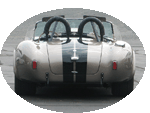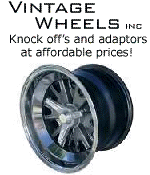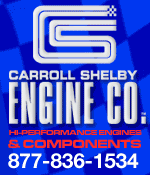 
 Main Menu
Main Menu
|
 Nevada Classics
Nevada Classics
|
 Advertise at CC
Advertise at CC
|
 December 2025
December 2025
|
| S |
M |
T |
W |
T |
F |
S |
| |
1 |
2 |
3 |
4 |
5 |
6 |
| 7 |
8 |
9 |
10 |
11 |
12 |
13 |
| 14 |
15 |
16 |
17 |
18 |
19 |
20 |
| 21 |
22 |
23 |
24 |
25 |
26 |
27 |
| 28 |
29 |
30 |
31 |
|
|
|
|
 CC Advertisers
CC Advertisers
|
|

03-21-2010, 06:46 PM
|
 |
Half-Ass Member

|
|
|
Join Date: Jun 2005
Cobra Make, Engine: ERA #732, 428FE (447 CID), TKO600, Solid Flat Tappet Cam, Tons of Aluminum
Posts: 22,025
|
|

 Not Ranked
Not Ranked
Ernie's cost saving argument is pretty much bogus.  But the zinc/phos availability is everywhere now. Every car catalog I get now seems to have their own "house oil" that is "extra rich in zinc & phos" -- I think the Summit catalog that came yesterday was the most recent with their own house brand. If you run the right oil, and if you haven't wiped a lobe in the first 1000 miles or so, your SFT will be around a long, long time. |
-
Advertising


03-21-2010, 06:59 PM
|
 |
CC Member

|
|
|
Join Date: Jul 2005
Location: Virginia Beach, Va & Port Charlotte, Fl.,
Posts: 2,292
|
|

 Not Ranked
Not Ranked
Quote:
Originally Posted by patrickt

Ernie's cost saving argument is pretty much bogus.  But the zinc/phos availability is everywhere now. Every car catalog I get now seems to have their own "house oil" that is "extra rich in zinc & phos" -- I think the Summit catalog that came yesterday was the most recent with their own house brand. If you run the right oil, and if you haven't wiped a lobe in the first 1000 miles or so, your SFT will be around a long, long time. |
The jury really hasn't reached a verdict on this additive thing either. I've heard some reports on the Chebby forums of wiped FTs, even after reportedly using said additives in subsequent oil changes. Don't the additive ppm quantities diminish in the oil with age?
As said countless times before, it ends up being a personal choice kinda thing. To me it's an unnecessary risk with a comparative cheap $400 buy-in, not to mention that "roller cam" bragging rights.. 
__________________
Too many toys?? never!
|

03-21-2010, 07:00 PM
|
 |
CC Member

|
|
|
Join Date: Oct 2002
Location: Eagle,
Ne.
Cobra Make, Engine: 1966 Lone Star 427SC.
Posts: 4,310
|
|

 Not Ranked
Not Ranked
Undy- I forget what valve train you're using ?
__________________
Regards,
Kevin
|

03-21-2010, 07:04 PM
|
 |
Half-Ass Member

|
|
|
Join Date: Jun 2005
Cobra Make, Engine: ERA #732, 428FE (447 CID), TKO600, Solid Flat Tappet Cam, Tons of Aluminum
Posts: 22,025
|
|

 Not Ranked
Not Ranked
Quote:
Originally Posted by undy

The jury really hasn't reached a verdict on this additive thing either. I've heard some reports on the Chebby forums of wiped FTs, even after reportedly using said additives in subsequent oil changes. Don't the additive ppm quantities diminish in the oil with age?
As said countless times before, it ends up being a personal choice kinda thing. To me it's an unnecessary risk with a comparative cheap $400 buy-in, not to mention that "roller cam" bragging rights..  |
I wonder whether the additives work or not, too. I just use Brad Penn, which is really the same old hi-level zinc/phos oil that you could get decades ago along with a bottle of the old EOS. I haven't heard of too many lobe wipes any more. It seems like everyone has caught on and maybe the bad lifters have all died by now. Some of the smarter builders seemed to think there were some weak metal lifters that were the main culprits. |

03-21-2010, 07:08 PM
|
 |
CC Member

|
|
|
Join Date: Jul 2005
Location: Virginia Beach, Va & Port Charlotte, Fl.,
Posts: 2,292
|
|

 Not Ranked
Not Ranked
Quote:
Originally Posted by FUNFER2

Undy- I forget what valve train you're using ?
|
2.19"/1.74" Stage 2 KC Ebocks, KC sourced Crane Hydraulic Roller lifters with his custom grind Comp Cams cam. 242/252 .638"/.646 (best I recall). Erson rockers (The only thing I'd ever put on a set of Eboks ... plug and play rockers) Smith brother's pushrods.
__________________
Too many toys?? never!
|

03-21-2010, 07:11 PM
|
 |
CC Member

|
|
|
Join Date: Jul 2005
Location: Virginia Beach, Va & Port Charlotte, Fl.,
Posts: 2,292
|
|

 Not Ranked
Not Ranked
Quote:
Originally Posted by patrickt

I wonder whether the additives work or not, too. I just use Brad Penn, which is really the same old hi-level zinc/phos oil that you could get decades ago along with a bottle of the old EOS. I haven't heard of too many lobe wipes any more. It seems like everyone has caught on and maybe the bad lifters have all died by now. Some of the smarter builders seemed to think there were some weak metal lifters that were the main culprits.
|
Don't forget the massive in-rush of inferior Chinese cam cores too... I also believe a lot of these failure can be attributed to poor materials and off-shore produced performance products.
__________________
Too many toys?? never!
|

03-21-2010, 07:32 PM
|
 |
CC Member

|
|
|
Join Date: Oct 2002
Location: Eagle,
Ne.
Cobra Make, Engine: 1966 Lone Star 427SC.
Posts: 4,310
|
|

 Not Ranked
Not Ranked
What company's are they ?
__________________
Regards,
Kevin
|

03-21-2010, 07:40 PM
|
|
Senior Club Cobra Member

|
|
|
Join Date: Jul 2002
Cobra Make, Engine:
Posts: 15,712
|
|

 Not Ranked
Not Ranked

Since Undy has the "deep pockets" expense is no object for him. 
I 100% stand by my conclusion that you can do a flat tappet cam setup for a FRACTION of the cost of a roller set up. Bogus argument? No way!
Let's look at some basic numbers for BASIC hardware, nothing exotic that may well be RECOMMENDED by many of todays engine builders and cost CONSIDERABLY more than the prices I've listed here.
Approximate cost comparisons:
Flat tappet cam: $150
Roller cam: $250
Flat tappet lifters: $80-$90
Rollers: $250 to $450 (retro fit to a 427 big block in the later case).
You'll need $200-$300 more for push rods, valve springs and misc IF you do your own work. Add considerably more if your paying an engine builder to do the job. Maybe you could sell your old flat tappet parts on e-bay? Don't hold your breath...
The "soft cam material" argument doesn't hold water. The Chinese steel argument doesn't cut it. And I DO acknowledge some Chinese stuff was pretty poor quality, still is, ya get what you pay for. The research is pretty clear on flat tappet cam failures which caught the ENTIRE industry by surprise across the board. Two things: Modern oil, which is easily rectified with additives readily available. Break in procedures, THAT is the primary cause. Within 20 minutes of FIRST STARTING a new engine you have already established the "break in". That cam is going to live or die based on that first 20 minutes.
Don't think you can't wipe out a hydraulic roller cam either!!! Run 'em hard and push their rpm limit and the lifters begin to fail, that leaves clearance problems, that leads to cam/lifter failure. Just as ugly as any other cam/lifter failure. THAT is why many of todays engine builders will recommend the latest, greatest and best roller lifter technology available. And it's going to cost you a LOT more than a set of flat tappet lifters and well above the prices I've listed here!
Personally I would NOT run a "basic" low cost hydraulic roller cam on the track and be pushing my rpm limits with it. While you may "float the valves" with a flat tappet, they aren't anywhere near the danger of "floating the valves" on a hydraulic roller.
If the issue is simply one of "max power" a solid roller of any kind will ALWAYS outperform a hydraulic roller, period!
If the issue is "money", the flat tappet win's hands down, no contest.
If the issue is good street manners, good power over a broad range of rpm and limiting max rpm for long life, hydraulic roller is a good choice. Assuming race and money are not primary issues of course.

|

03-21-2010, 07:47 PM
|
 |
Half-Ass Member

|
|
|
Join Date: Jun 2005
Cobra Make, Engine: ERA #732, 428FE (447 CID), TKO600, Solid Flat Tappet Cam, Tons of Aluminum
Posts: 22,025
|
|

 Not Ranked
Not Ranked
OK, If I drop off an FE block at my favorite engine builder and ask him to build me a SFT engine, and then ask him what the additional cost is going to be to "upgrade" to a solid roller, that cost is going to be less than, say, $500. Correct?
|

03-21-2010, 08:23 PM
|
|
Senior Club Cobra Member

|
|
|
Join Date: Jul 2002
Cobra Make, Engine:
Posts: 15,712
|
|

 Not Ranked
Not Ranked

Yeah, theoretically, the cost difference could be as little as $500, for a SOLID roller. Hydraulic roller is the most expensive option.
Depending on who your builder is the cost of the parts will likely be much more than the price I've listed for two reasons. #1 you'll be paying top retail price, even if you think your getting a discount, the cost will be factored in some other area. #2 it's unlikely he will build your big horse power Cobra motor with "basic" parts. All though you could go with a local builder who will indeed build it to your budget, caveat emptor.
Here comes the kicker:
The price of the parts will rise (like the ramp on a roller cam) considerably faster for quality roller parts than it will for quality flat tappet parts.
Premium parts would be the logical standard for a good quality builder if he offers a warranty. You could save even more if you went with some non-brand name (solid or roller) lifters compared to a well known brand name lifter. But "no name" lifters are notorious for being inferior, this is one area where I will not scrimp! I wonder how many flat tappet cams have been lost due to inferior foreign lifters and the cam manufacturer is the one who takes the heat???
The "savings" could buy you a nice Armando road racing oil pan. Or a nice set of March pulleys, etc. etc.
Last edited by Excaliber; 03-21-2010 at 08:29 PM..
|

03-21-2010, 09:03 PM
|
 |
Senior Club Cobra Member

|
|
|
Join Date: Feb 2007
Cobra Make, Engine: KMP 539, a Ton of Aluminum
Posts: 9,592
|
|

 Not Ranked
Not Ranked
Quote:
Originally Posted by Excaliber

Yeah, theoretically, the cost difference could be as little as $500, for a SOLID roller. Hydraulic roller is the most expensive option..
|
If you're pinching pennies, then a flat tappet cam is the choice, but roller cams offer less friction and more power. Also, ZDDP is a non-issue.
IMHO, if I were looking for a used Cobra and that Cobra came with a flat tappet cam, then I would offer a lot less for that Cobra without the roller, since I know I would eventually ditch the flat tappet cam. Quickly. |

03-21-2010, 09:15 PM
|
|
Senior Club Cobra Member

|
|
|
Join Date: Jul 2002
Cobra Make, Engine:
Posts: 15,712
|
|

 Not Ranked
Not Ranked
Actually I am considering a rebuild on my side oiler, possibly this coming winter. There are some internal modifications I've been thinking I might want to do. All though, the motor is running terrific right now with about 7,000 miles on it. As such I've been looking carefully at my cam options, hydraulic roller being one such option. I might change the dual carbs to a single center pivot float as well for better throttle response in the tight corners. Possible 5 speed. I'm still undecided on how far to take it down. Flat tappet remains a strong contender for my personal selection though.
|

03-22-2010, 04:43 AM
|
 |
CC Member

|
|
|
Join Date: Jul 2005
Location: Virginia Beach, Va & Port Charlotte, Fl.,
Posts: 2,292
|
|

 Not Ranked
Not Ranked
All this talk about engine builder this, engine builder that.. Where's the current push-rod engine technology going these days, Chrysler's hemi and Chebby's LS engine series?? Hydraulic rollers are the fare-o-the-day. The LS7 spins to 7K with them. They make more power, less maintenance and YES greater longevity. The only dog that's going to hunt in the SFT camp is Retro Mutt.
__________________
Too many toys?? never!
Last edited by undy; 03-22-2010 at 04:45 AM..
|

03-22-2010, 06:46 AM
|
|
Senior Club Cobra Member

|
|
|
Join Date: Jul 2002
Cobra Make, Engine:
Posts: 15,712
|
|

 Not Ranked
Not Ranked
Uh, using an LS series engine in MY Cobra is not an option to even consider. I like retro, in fact, that's kind of the whole point with Cobras in general.
|

03-22-2010, 07:17 AM
|
|
CC Member

|
|
|
Join Date: Dec 2001
Location: Louisville,
KY
Cobra Make, Engine: I'm Cobra-less!
Posts: 9,417
|
|

 Not Ranked
Not Ranked
He didn't say anything about putting an LS in a Cobra. He was talking about how technology has completely bypassed flat tappet junk.
On another note, if you can that an FE has a roller cam in it by opening the hood and looking, you're a better man than me.
I, on the other hand, can tell if an engine has a flat tappet cam in it.....it's the engine that's being taken apart, completely disassembled, and cleaned, because the cam wiped down.  |

03-22-2010, 07:44 AM
|
|
Senior Club Cobra Member

|
|
|
Join Date: Jul 2002
Cobra Make, Engine:
Posts: 15,712
|
|

 Not Ranked
Not Ranked
High tech comes with a high price, knock yourself out. Don't forget the $6,000 (or more) after market fuel injection, the computer and the dry sump while your at it. If your going to compare an LS7 to a side oiler...
$1,500 plus MINIMUM for the best after market hydraulic roller set up MIGHT get you close to 6,500 rpm. Cam, lifters, retainers, springs, etc.
A flat tappet set up costs a FRACTION of that, will deliver more horse power, turn higher rpm's and live a long life on the street. WITH a single naturally aspirated carb, wet sump and all that other "junk" in an antigue design from the 60's. Commonly known as a "Cobra". Just keeping the faith baby!  |

03-22-2010, 07:58 AM
|
|
CC Member

|
|
|
Join Date: Dec 2001
Location: Louisville,
KY
Cobra Make, Engine: I'm Cobra-less!
Posts: 9,417
|
|

 Not Ranked
Not Ranked

Once again, no one said anything about EFI, computers, and the like. We're talking about putting a cam in and having a better chance than 50/50 that the thing is going to live.
Step into the modern age with cams that don't wipe down and give extra horsepower to boot.
I would gladly pay the extra $350 to make sure the engine doesn't whittle itself away.....disassembly, cleaning, and refresh costs are a lot more than that. I'd pay the $350 for the extra 30-40 hp alone. For a small block, the cost difference is even less significant as hydraulic roller lifters are $120.
The truth be known, hydraulic rollers will get you your 6500 for a LOT (yes, I can type words in all caps too) less than $1500.
No one said anything about originality....we're talking about making engines survive and getting power to boot. I'd rather work on a carb than an injected motor any day.....but I also like not having to worry about cam breakin, special cam lube, $7/quart break-in oil, blah, blah, blah. I've said this on many other threads....but I've never put a flat tappet cam in an engine that I've built for a customer. And never will.
|

03-22-2010, 08:00 AM
|
 |
CC Member

|
|
|
Join Date: Jul 2005
Location: Virginia Beach, Va & Port Charlotte, Fl.,
Posts: 2,292
|
|

 Not Ranked
Not Ranked
Quote:
Originally Posted by Excaliber

High tech comes with a high price, knock yourself out. Don't forget the $6,000 (or more) after market fuel injection, the computer and the dry sump while your at it. If your going to compare an LS7 to a side oiler...
$1,500 plus MINIMUM for the best after market hydraulic roller set up MIGHT get you close to 6,500 rpm. Cam, lifters, retainers, springs, etc.
A flat tappet set up costs a FRACTION of that, will deliver more horse power, turn higher rpm's and live a long life on the street. WITH a single naturally aspirated carb, wet sump and all that other "junk" in an antigue design from the 60's. Commonly known as a "Cobra". Just keeping the faith baby!  |
Ahhh... Retro Mut's rearing his flat tappet head again. 
By 6500 a stroked FE is done anyway, at least it should be.
I do agree though, a SFT has it's place.. (in your car) 
__________________
Too many toys?? never!
|

03-22-2010, 08:20 AM
|
|
Senior Club Cobra Member

|
|
|
Join Date: Jul 2002
Cobra Make, Engine:
Posts: 15,712
|
|

 Not Ranked
Not Ranked
Realistically I don't think there is any hydraulic roller currently available that will take a side oiler to 6,500. Last I heard the limit with the BEST stuff was around 6,100 or so on a good day. My side oiler is not stroked, by the way, and has seen 7,000 rpm on a number of occasions.
A recent Shelby build I was reading about, Shelby block, E-brock heads, hydraulic roller, a typical "modern" FE build for today, cranked out just UNDER 500 horse at 5,600 rpm. Yawn,,,,  BUT, it did have some remarkable torque from a relatively low rpm range, so that's pretty cool. |

03-22-2010, 08:27 AM
|
|
CC Member

|
|
|
Join Date: Dec 2001
Location: Louisville,
KY
Cobra Make, Engine: I'm Cobra-less!
Posts: 9,417
|
|

 Not Ranked
Not Ranked
I would yawn at that too...
But I could also find an FE build with a solid flat tappet that made less than 500...
As you know Ernie, it's all about the camshaft profile...
I would venture to say that Dave's FE (with Edelbrock heads and a hydraulic roller) makes a little more than 500.....
|
 Posting Rules
Posting Rules
|
You may not post new threads
You may not post replies
You may not post attachments
You may not edit your posts
HTML code is Off
|
|
|
All times are GMT -7. The time now is 07:02 PM.
|


























 Linear Mode
Linear Mode



